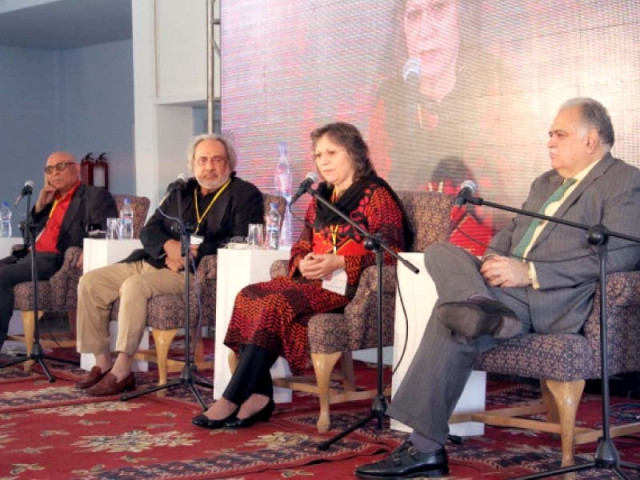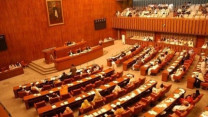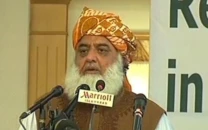‘It’s just a Faiz, it will go away.’ It never did
Speakers agreed that while Faiz, the man, is forgotten, Faiz, the poet, will never be.

“I will soon be publishing the letters that Faiz wrote to me. While they were letters for his daughter, they were written by a poet, not a father. However, they are still written by a Faiz people don’t know, the Faiz I love,” Moneeza Hashmi.
What do poets do when words fail them? What do eminent scholars — master of words and prose — do when they are left speechless? They turn to the words of Faiz Ahmed Faiz, or in the words of the panel discussing ‘The Faiz Everyone Loves’ at the first day of the Karachi Literature Festival, “he comes to our rescue.”
When moderator Bari Mian introduced the panel, it was clear that fewer people would be more qualified to discuss the poet. First to be introduced was Moneeza Hashmi, the daughter of Faiz himself, followed by Wajid Jawad, a published author on the works of Faiz, and finally Mahmood Jamal, who has translated the poet’s work. Before allowing the panel to speak, Mian had a few words of his own. “Faiz is not only a part of the literature of this country; he is part of its history.”

After some particularly powerful words from Mian, who was quoting Faiz — words the crowd had barely gotten over — Hashmi started portraying the Faiz she knew. Her words were just as straightforward as the man the session was celebrating. “I now call my father ‘Faiz Sahab’ and I derive great satisfaction from it,” said a surprisingly emotionless Hashmi. “He was an absentee father. He was in jail for a while when I was growing up and even when he wasn’t, he was surrounded by other people.”
She then went on to reveal the peculiar connection she had with her father. “I discovered my father through his poetry,” her monotonous tone revealing her lack of intimacy more than her words. “I will soon be publishing the letters that Faiz wrote to me. While they were letters for his daughter, they were written by a poet, not a father. However, they are still written by a Faiz people don’t know, the Faiz I love.”
While discussing the timeless nature of Faiz, she shared a time when someone remarked, “Parson ka likha hua ap ka shair, lagta hai ke aj likha hai.” He replied, ‘ap apnay haalaat hi nahi badaltay, is main hum kia kerain’.”
Jamal spoke like a man who loves the poet more than his daughter does. “He speaks to us in despair, in the individuality of romance and in the collective of a nation’s desolation,” he said admiringly. “He screamed in his whispers.”
He then shared the time he had met Faiz. “After getting his attention, I asked him why there is a dearth of intellectuals in the subcontinent.” Faiz’s reply was just as poignant as it was short. “Hum bik buhat juldi jatay hain.”
Jawad started off with a haunting monologue of Faiz about the partition of Pakistan. “Hum ke thehre ajnabi itni madaraton ke baad, phir banaingay aashna kitni mulaqaton ke baad? Kub nazar main ayegi bedaagh sabze ke bahar, khoon k dhabey dhulain gay kitni bersaton k baad?” Clearly a man with a penchant for quoting the haunting, he then went on to talk about Faiz’s take on Karachi. “Go sab ko baham sagar-o-bada to nahi tha, ye shahar udas itna ziyada to nahi tha. Thak kar yun hi pal bhar ke liye aankh lagi thi, so kar hi na utthen ye irada to nahi tha.”
However, Faiz’s power was best summed up by an audience member. “I was diagnosed with a terminal illness,” she revealed. “I kept reading Faiz’s ‘Jis Din Khiza Ayegi’ and it helped me get over the fear of death. I stopped looking at it like a phantom and embraced its inevitability.”
Mahmood ended the session with how the country feels without Faiz by quoting the poet himself, “Han magr teray siwa, teray siwa, teray siwa.”
Published in The Express Tribune, February 8th, 2014.



















COMMENTS
Comments are moderated and generally will be posted if they are on-topic and not abusive.
For more information, please see our Comments FAQ